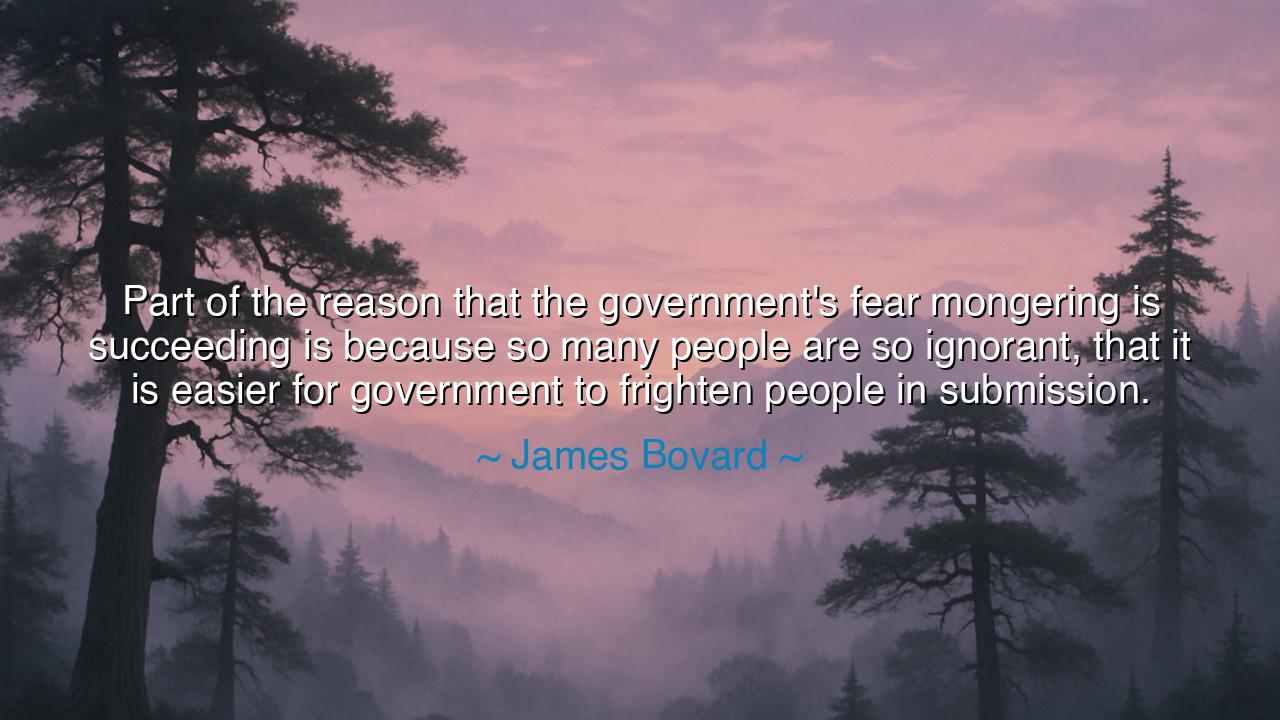
Part of the reason that the government's fear mongering is
Part of the reason that the government's fear mongering is succeeding is because so many people are so ignorant, that it is easier for government to frighten people in submission.






The words of James Bovard — “Part of the reason that the government's fear mongering is succeeding is because so many people are so ignorant, that it is easier for government to frighten people into submission.” — strike like the tolling of a dark bell through the corridors of power and complacency. In this haunting reflection, Bovard — the fierce critic of authoritarianism and complacent citizenship — lays bare a timeless and terrible truth: that ignorance is the most fertile soil for tyranny. His words are not merely an accusation against governments that deceive, but a warning to peoples who sleep. For when minds are untrained, when curiosity is dulled, and when truth is left untended, fear becomes the shepherd, and submission becomes the flock.
The origin of this quote lies in Bovard’s long struggle as a writer and libertarian thinker during the late twentieth and early twenty-first centuries, a time when governments across the world — including his own, the United States — often used fear as a tool of control. He watched as crises were magnified, as enemies were exaggerated, and as citizens, gripped by terror, surrendered liberties in exchange for the illusion of safety. From wars abroad to surveillance at home, Bovard saw how easily fear could bend free people into obedience. Yet he also understood the deeper cause — not merely deceit from above, but ignorance from below. For fear thrives best where wisdom is absent, and tyranny needs not only soldiers, but also citizens too frightened to question.
His words echo through history like a prophecy fulfilled again and again. In every age, rulers have learned that fear is stronger than reason. When the people know little and question less, they can be made to believe almost anything. The ancient Romans were told to fear foreign tribes; medieval kings conjured threats of heresy; dictators in the modern age invented conspiracies to justify oppression. The ignorant, Bovard reminds us, do not see these patterns — and so they obey, even when the chains are visible. Ignorance is the accomplice of fear, and together they are the architects of submission.
Consider the world during the Cold War, when nations lived under the shadow of nuclear annihilation. In the United States, fear of communism drove neighbors to spy upon neighbors; in the Soviet Union, fear of treason drove millions to imprisonment or death. In both cases, governments used fear to justify control. It was not truth that guided men, but terror — not wisdom that protected freedom, but ignorance that destroyed it. Those who questioned were branded as traitors; those who conformed were praised as patriots. Thus, through fear, the spirit of inquiry was silenced, and through ignorance, freedom was betrayed. Bovard’s warning is that this pattern never truly ends — it changes only its costume.
Yet his message is not one of despair, but of awakening. For if ignorance feeds fear, then knowledge is the antidote. When people are educated — not merely schooled, but truly awakened to the habits of critical thought — they become ungovernable by lies. A population that understands history cannot be easily fooled by its repetition; a mind that knows truth cannot be enslaved by propaganda. The tyrant’s greatest weapon is the empty mind; the citizen’s greatest defense is the enlightened one. Bovard’s words are a summons to this enlightenment — a call to reclaim the sacred duty of thinking for oneself.
There is in this quote also a moral rebuke to those who prefer comfort to courage. For ignorance is not always the absence of knowledge — often it is the refusal to seek it. Many would rather be comforted by fear’s simplicity than challenged by truth’s complexity. Governments succeed in fear-mongering not only because they deceive, but because people allow themselves to be deceived. They close their ears, turn away from discomfort, and surrender their judgment. In doing so, they trade the burden of responsibility for the ease of obedience. But Bovard, like the prophets of old, reminds us that freedom has never belonged to the timid. It must be earned, defended, and understood — or it will be taken away under the pretense of protection.
So let this be the lesson carried forward: beware the comfort of ignorance, for it is the doorway through which fear enters. Question what you are told, seek knowledge as the highest virtue, and do not let fear cloud your reason. Governments will always be tempted to rule through fear, for fear is efficient — it requires no persuasion, only obedience. But a people who know, who question, who refuse to bow before panic — they are the nightmare of every tyrant and the hope of every age.
And thus, remember Bovard’s immortal warning: a fearful people cannot be free, and an ignorant people cannot be brave. To resist fear is to reclaim one’s dignity; to seek knowledge is to reclaim one’s power. Let the light of wisdom scatter the shadows of deception, and let every citizen stand not as a subject, but as a steward of truth. For when the mind is awake, no government, however cunning, can frighten it into submission.






AAdministratorAdministrator
Welcome, honored guests. Please leave a comment, we will respond soon